- Home
- Anthony Burgess
The Kingdom of the Wicked Page 7
The Kingdom of the Wicked Read online
Page 7
‘The money is nevertheless that of you and your husband to give. I ask again: do you abet the lie?’
‘I am no liar,’ she said. ‘Were we not entitled to some small place of our own? Where are a man and his wife to live? There are things a husband and wife must do in private, they cannot sleep as in a jail with strangers who call themselves brothers snoring around them or keeping awake to watch what is forbidden.’
‘So some of the money has been kept back. Yes, Ananias?’
‘Nothing has been kept back. This I swear.’
‘We’re enjoined by our master not to swear but to say plain yes and no. Are you a liar, Ananias?’
‘Whatever is meant by liar. We were granted a small messuage of the farm, no more than an outhouse. But the money from the sale is all there.’
‘So,’ Peter said, ‘Ananias the liar finally speaks the truth. Go now, and Saphira with you. We’re not like the Romans or the Sanhedrin. We exact no punishment, leaving that to God. For now the knowledge of wrongdoing should be punishment enough. Savour your crime alone, the two of you.’ And he turned his back on them.
‘Give me a little water,’ Ananias said. ‘I feel faint. My heart is not strong.’ Nobody gave him anything. ‘I see. The giving is all on one side. This shall be a curse to you, you will see.’ And he left tottering, supported by Saphira. Matthias said to Peter:
‘Forgive my presumption – I know I am the newest of the company and so understand least – but I can’t see how Ananias was wrong. I had the opportunity to have my nephew freed – I mean Caleb. It was a matter of paying out money. How if I had kept back money that was really my own?’
‘Was,’ James the other, son of Zebedee, said. ‘Was, remember that. Now you are in a happy position. Before you were in confusion, for you knew that bribes did not work and yet you had the faint hope that one might. It’s always best to be without money. Turn money into what can be consumed and consumed quickly. That rids a man of confusion and greed and many another vice.’
‘You would have lost your money,’ Peter said, ‘and, if things had not worked out differently through God’s grace, your nephew would have lost his life. The Romans don’t make bargains, James is right. Things have worked out for the best. Always look for the hand of God.’
‘As now?’ Matthias asked. He was looking out into the street, where Ananias had fallen into the dust. Saphira was bending over him, her hand on his bared chest, feeling for the heartbeat. She raised her head and her voice, crying for help. A laden camel went by, roaring out of its own inner dissatisfaction, and it was led by a man who, though not roaring, had troubles of his own. A dry wind bestowed more dust on Saphira and her husband. Two fat women passed with baskets loaded for the market, chattering.
‘I thought we preached charity,’ Matthias said. ‘Or should I say that there is a gulf between preaching and practising?’
‘God hates a liar,’ Peter said doubtfully.
Caleb arrived at Sebaste, the capital city of Samaria. This, which had once borne the name of the country itself, had been rebuilt in the Greek style by Herod the Great and named for the Roman Emperor Augustus, who was styled in Greek Sebastos. Caleb saw in morning sun the hill Gerizim, on which the Samaritans had built their own temple to rival that of Jerusalem. It was not so fine to look at, though its east facing gold and silver doors were as brilliant in the sun as those of the city of true holiness. There could be no real holiness here, so the Judaeans taught. A lot of half-breeds. Assyrian blood, blood of the Hasmoneans, a bad lot. But the people looked much like Caleb’s own. They wore dirty robes, chaffered at fruit stalls, spat, scratched. An unveiled girl of rare pale beauty looked down wistfully from a high window and was then roughly dragged in to darkness by a scolding voice.
Beggars cried for alms in the name of Jehovah. A man in white-edged black with an Assyrian beard performed conjuring tricks before an idle knot of citizens the police rudely beat from the thoroughfare of burdened donkeys and camels, a closed litter in the Roman style borne on tough poles by near-naked men who looked like Ethiopians. There were, as in Jerusalem, Syrian troops but more decurions of Italic blood. Caleb had a few coins stamped with the head of Tiberius Caesar, given to him by Ananias when he left the thin pale community of the Essenes. He found a small tavern and broke his fast. The bread here was baked hard in thin slabs on oiled iron. The wine was more pink than red. The girl who served him noted his accent. From where? Jerusalem. She was not impressed.
It was near noon when he met Samaritans of his own age and something of his own fire. This was in the bathhouse attached to the temple on the hill Gerizim. When he stripped to sluice himself they saw the fresh scars on his back. They called an older man who, combing his wet hair with five tines of iron, came over and looked at the scars before properly engaging the eyes of their possessor. ‘Who are you?’ the man said. ‘What are you doing here?’
‘Caleb from Jerusalem. One of the Zealots. Scourged by the Romans. Escaped crucifixion.’
‘We don’t hold much here,’ the man said, ‘with the people of Judaea. The Romans did a good thing when they freed us from Judaean rule.’
‘But now it’s a Roman Judaea that rules you. Is that any better?’
‘We don’t hear much from your Pontius Pilate. It’s all left to the prefect. He’s a bastard called Gracchus who’s got his eye on this temple here. The usual thing. Loot, loot, more loot.’
‘I take it you head the freedom force.’
The man gave a single guffaw. ‘That’s a pompous way of putting it. No, I’m not a leader or anything like it. Call me more of a spy. I work in the prefecture as a sort of clerk. One thing I’ve found out is that they’re reducing the garrison here. Increasing it in Judaea. What’s going on there? Is it to do with you?’
‘There’s this new sect, the Nazarenes. I gather there’s been a miracle or something like it, and there’s a lot of enthusiasm. It won’t last, that sort of thing never does, but the Romans get worried when the Jews get enthusiastic.’
‘What are you after here? We’re not your people.’
‘I should have thought this was the wrong time for division. Zealots are Zealots, I should have thought, wherever they are. It’s time to strike.’
‘And what do you get out of striking?’
‘We get rid of the Roman presence. It’s been around too long. We get the House of David ruling the kingdom of Palestine.’
The Samaritan stroked one cheek then another. He said: ‘We’re not too sure here whether we want to be back under a Judaean king. But we certainly don’t want the Romans here. You’d better have a word with John.’
‘Who’s John?’
‘His father named him after John Hyrcanus. He dropped the Hyrcanus for obvious reasons. You know who John Hyrcanus was?’
‘He took over here over a century ago, didn’t he? Destroyed your temple as a blasphemous parody and so on.’
‘John’s father had this mad idea that there was conqueror’s blood in the family. John and he have come to blows. John’s just John, a good Biblical name. John wants to kill Gracchus.’
‘The prefect?’
‘Gracchus had John whipped. Like you were whipped. Some charge to do with embezzlement, false of course. John used to carry money from the treasury to pay the troops. We know who the real embezzler was.’
‘Well, why doesn’t he stick the knife in?’
‘Not easy. Are you used to fighting?’
‘I led a raid against a desert camp once. The time’s come to strike nearer the centre now, I think. The point is this, as I see it. It’s not a question of winning pitched battles against the Romans. It’s a matter of convincing the Romans that there’s nothing for them in Palestine. It happened before. They’ll be ready to take their governors out and let the Herod blood back in again. It’s bad blood but it’s native blood. And it’s the beginning of something better.’
This John whom Caleb met was nearly all black beard and total baldness, though young enoug
h. He sat cross-legged mending sandals on the city’s outskirts. His hovel was dusty. He said:
‘We’ve had strangers like you here before. Sadducees in the pay of the Romans.’
‘Of course,’ Caleb said. ‘And I laid on the whip myself. I enjoy that sort of thing.’ He showed. John whistled. Caleb said: ‘How many men do you have?’
‘I can gather two hundred. Good raiding material. Trained in knifing, garrotting. Outposts mostly, of course. We’ve been quiet lately. We’re a bit slack. A raid on the prefecture, the city barracks is next door. Not ready for it. I don’t know, though. We can’t wait for ever. Gracchus has to be crucified.’
‘You mean that?’
‘A knife in his throat – too easy. Crucified and then burnt.’
‘You’re a hard man, John,’ Caleb grinned.
The raid was daring and God, or something, was on their side. They invaded the city barracks before daybreak, strangled the guard, knifed a sleeping centurion and a couple of decurions who were already awake. They attacked naked men fearful in barrack dormitories, then they set the wooden building afire. They had difficulty in firing the stone prefecture, but they smashed all within, burnt documents, killed the watchmen and set off for the suburban villa of the prefect. Gracchus appeared in his nightgown. A Samaritan succuba tried to escape, still warm from his bed, but she was held and her hair set alight. The guards had their throats slit. Then Gracchus was hauled sobbing down the road to the city centre. The entire town was awake, and men with buckets of water were trying to stop the spread of the barracks fire to innocent homes and shops. Smoke and flame made a good background for the enactment which John personally supervised. The Samaritans had found enough wooden crosses – the new kind with crosspiece already nailed to upright, upright sharpened to a stake’s sharpness at the foot end – in the barracks yard. Gracchus was lovingly nailed naked to one of these, and he sobbed and howled in a dialect which none present knew – a form of Oscan or Umbrian, perhaps, from his native village. He cried at one point for his mamma, and everybody registered the word without compassion. The hole was speedily and sweatingly dug for the crosspoint, and the burdened cross was set in, swaying, unfirm, but that did not matter. Before the casting of burning pitch on the still-living body, John cut off the genitalia in a single swish with a cobbler’s knife. Caleb to his shame vomited.
Tiberius’s scream was less desperate but it inspired fear. The messenger who had brought dispatches from Syria through Rome stood sweating in the manner of all who bring bad news. Tiberius’s pet snake, wreathed round his shoulders, responded to her master’s mood by hissing. Tiberius banged with his fist on the wooden table of the arbour and sent winecups flying. Gurtius Atticus stood grimly by. Tiberius got words out at last.
‘How much more shall we tolerate? Have I not done more for these Jews than than than—’
The repetition of quam became manic. Curtius said:
‘Yes, Caesar. You gave them back their own property. Some of it.’
Tiberius hissed like his snake. ‘Don’t try your stoic sarcasm on me, Curtius. Your white hairs grant you no immunity—’
‘Have me killed, Caesar, if it will ease your frustration. Frustration you’ve brought on yourself. This revolt in Palestine is only one symptom of a total sickness. Armies in revolt on the Rhine. Thugs in the Senate. I say again though I am sick of saying it—’
‘I will not go back to Rome. Let’s see what the fool has done.’ He read the dispatch once again. ‘The Third Legion moved in from Syria. He wants the Miliara division recalled from Egypt. Roman rule. Roman order. Roman blood spilt in Samaria – wherever Samaria is.’
‘It’s a part of your Empire, Tiberius. Read on and you’ll see what his real foolishness was. A raid on a native temple. Wagons loaded with sacred vessels. The temple treasury ransacked. He officially entered Samaria to restore order, not provoke more disorder.’
A couple of naked boys, playing and giggling, got unawares into the path of the tigerpacing Tiberius. He tore at them with his bare hands. A servant shooed and beat off the children but was himself beaten. Another servant proffered a refilled winecup (a beautiful one made in Herculaneum, the handles naked bronze bodies and the cup itself like a pregnant belly) and had it knocked out of his hand. ‘Fetch more, you clumsy fool,’ he cried. He cried to Curtius: ‘Pilate has to go. Send an immediate dispatch recalling him—’
‘He comes under the Syrian governor. We should leave that sort of thing to Flaccus.’
‘Get Marcellus sent out in his place. Another fool, corrupt and incompetent. Who can we send?’
‘The Empire,’ Curtius said, ‘is forgetting how to breed administrators. Perhaps you’d be wiser to put the whole province under one of the native princes.’
‘Another fool, if you mean this Herod Agrippa. A whole family of corrupt and cruel idiots—’
‘Well, they’ve been brought up on the Roman example, Caesar.’
‘My heart,’ Tiberius whispered dramatically. His lips had now turned noticeably blue. ‘The palpitations are coming back. Are they trying to kill me, the fools and ingrates? Take me to my bedroom. Fetch me a litter. And you’re the biggest fool of them all. I can hardly crawl, and you want me to go back to Rome.’
On the other side of the island Gaius Caligula and Prince Herod Agrippa played ball. It was a simple game of throwing and mostly missing. Lithe naked female slaves retrieved the taut silk globe stuffed with duckdown. A wasp alighted on Gaius’s bare arm. He cried extravagantly, much in the manner of his imperial great-uncle: ‘It’s bitten me, it’s stung me, I shall die. Got you.’ He held up the insect to the setting sun and carefully tore off its wings. Herod Agrippa wearily fell on to a pile of cushions. A slave’s breasts swung over him as she wiped his sweating forehead. Gaius limped over to join him. He took a breast in his left hand and examined it curiously, as for blemishes. Then he withdrew his hand and let it bounce to rest. Gaius was not handsome. His neck was thin and his legs spindly. His brow was broad but his scalp very nearly bald. He made up for his lack of head-hair with a thick pelt over his chest and big belly. His complexion was of the colour of rancid lard. As he reclined he kicked off his little boots. Herod Agrippa said:
‘You need a larger size.’ And Gaius said:
‘The Emperor Littleboots.’ He giggled. ‘The army loves me, Herod. They’ll never be disloyal to Littleboots.’
‘Emperor sooner than. Judging from.’
‘It’s his heart, Herod. An old man’s heart. He’s lived too long. Still, we’ll leave it all to nature, I think. It’s your people that brought this on, you know. The talons of the imperial eagle shall dig into the heart of the Jewish nation. Hard words, Herod. And then he had to be put to bed.’
‘Only a Jew understands a Jew,’ Herod said. ‘You people made a big mistake. Roman procurators hardly willing to mouth a syllable of Aramaic. Telling the Jews about Jupiter and Venus and Mercury and the divine Emperor. No wonder the Jews laugh when they don’t cry.’
Gaius gave him a steady look and spoke very softly. ‘So,’ he said, ‘you don’t like the idea of a divine emperor?’
Herod Agrippa grinned but felt, as it were, the single kick of a little boot in his entrails. ‘For you, my dear, of course I become a true Roman with all the right pagan attitudes. I shall worship at your altar. I shall make your divine divinity cough with excess of incense. But you can’t blame the Jews for finding all these little gods rather childish and tiresome. After all, we thought of it first. One God, the creator and sustainer of the universe. The Romans and the Greeks as well are rather slow in grasping that concept, aren’t they?’
‘Oh, I’m not slow,’ Gaius said, ‘your royal Jewish lowness. I think the idea of one God a very attractive one. To be totally totally totally in control.’
‘Meaning?’ The little boot kicked harder.
‘You see, once the universe has been created, what is there left to do?’
‘The universe must be maintained. God watches over
it.’
‘Very tiresome and boring for God, I would say. The act of creation was his great thrill, and he can find a – what’s the word – commensurate one only in destroying it. Wouldn’t you say that’s reasonable? Pull it to pieces and then start again. Got you, you silly thing.’ He meant another wasp – Capri was full of them this season – which had made itself drunk on a patch of spilt wine on the marble table. He squinted at it, dewinging it with care. ‘Oh, we’ll have great games when I’m installed in Rome and you’re in your palace in Jerusalem. Visiting each other, you know, playing games. But I shall have to win always, Herod Agrippa, because I’ll be Emperor, you see, and you’ll just be a little king. But a little king is bigger than even a big prince, isn’t that so? I hope you’ll be duly grateful, your prospective Jewish majesty.’
‘Lord of the universe, I abase myself.’ But Herod Agrippa felt a certain nausea, playing these games with an Emperor designate he was fairly sure was moving swiftly from silliness to dementia. After all, he was in his forties and growing paunchy and grey. It was unseemly to be playing games with a boy of twenty-five or so, even though this boy was soon to become lord of the, if not the universe what the Romans thought of as the universe. He should be back there with his people. It was all his mother’s fault, sending him to Rome as a mere infant, there to be brought up as a Roman. His father Aristobulus, whom he had never known, brutally and perhaps unjustly executed. Look to the safety of the son. For what end? He would not be king, of that he was sure; there would always be a Roman governor in Judaea. He felt weary, overfed, coated with honey that had a curiously fecal smell. Gaius said:
‘You told me once there’s a secret Jewish name for the Lord of the universe. The ineffable name. What is it, Herod? Do tell me.’

 A Dead Man in Deptford
A Dead Man in Deptford Honey for the Bears
Honey for the Bears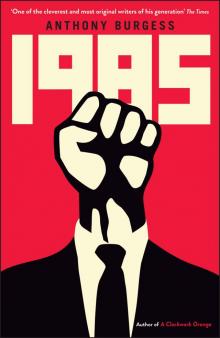 1985
1985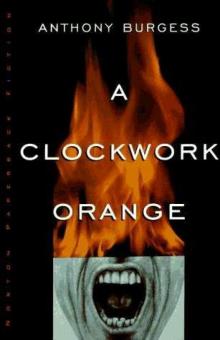 A Clockwork Orange
A Clockwork Orange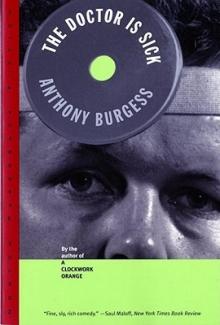 The Doctor Is Sick
The Doctor Is Sick Earthly Powers
Earthly Powers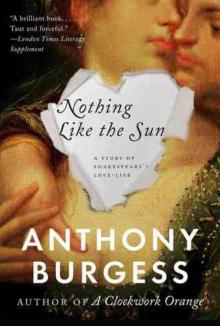 Nothing Like the Sun
Nothing Like the Sun Collected Poems
Collected Poems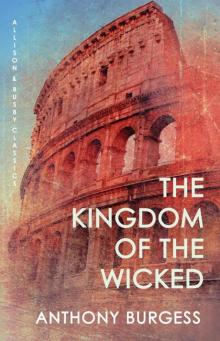 The Kingdom of the Wicked
The Kingdom of the Wicked The Wanting Seed
The Wanting Seed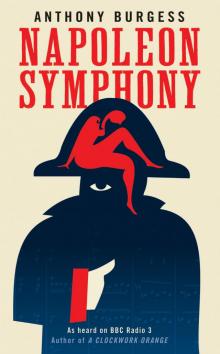 Napoleon Symphony
Napoleon Symphony The Malayan Trilogy
The Malayan Trilogy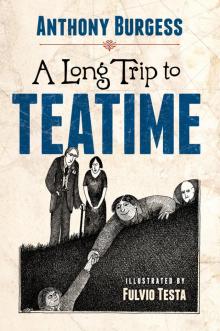 A Long Trip to Teatime
A Long Trip to Teatime Enderby Outside
Enderby Outside M/F
M/F The Complete Enderby
The Complete Enderby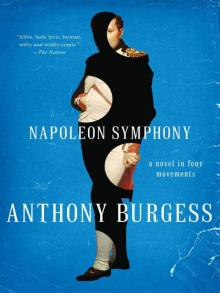 Napoleon Symphony: A Novel in Four Movements
Napoleon Symphony: A Novel in Four Movements Enderby's Dark Lady
Enderby's Dark Lady The Clockwork Testament (Or: Enderby 's End)
The Clockwork Testament (Or: Enderby 's End) ABBA ABBA
ABBA ABBA A Clockwork Orange (UK Version)
A Clockwork Orange (UK Version)